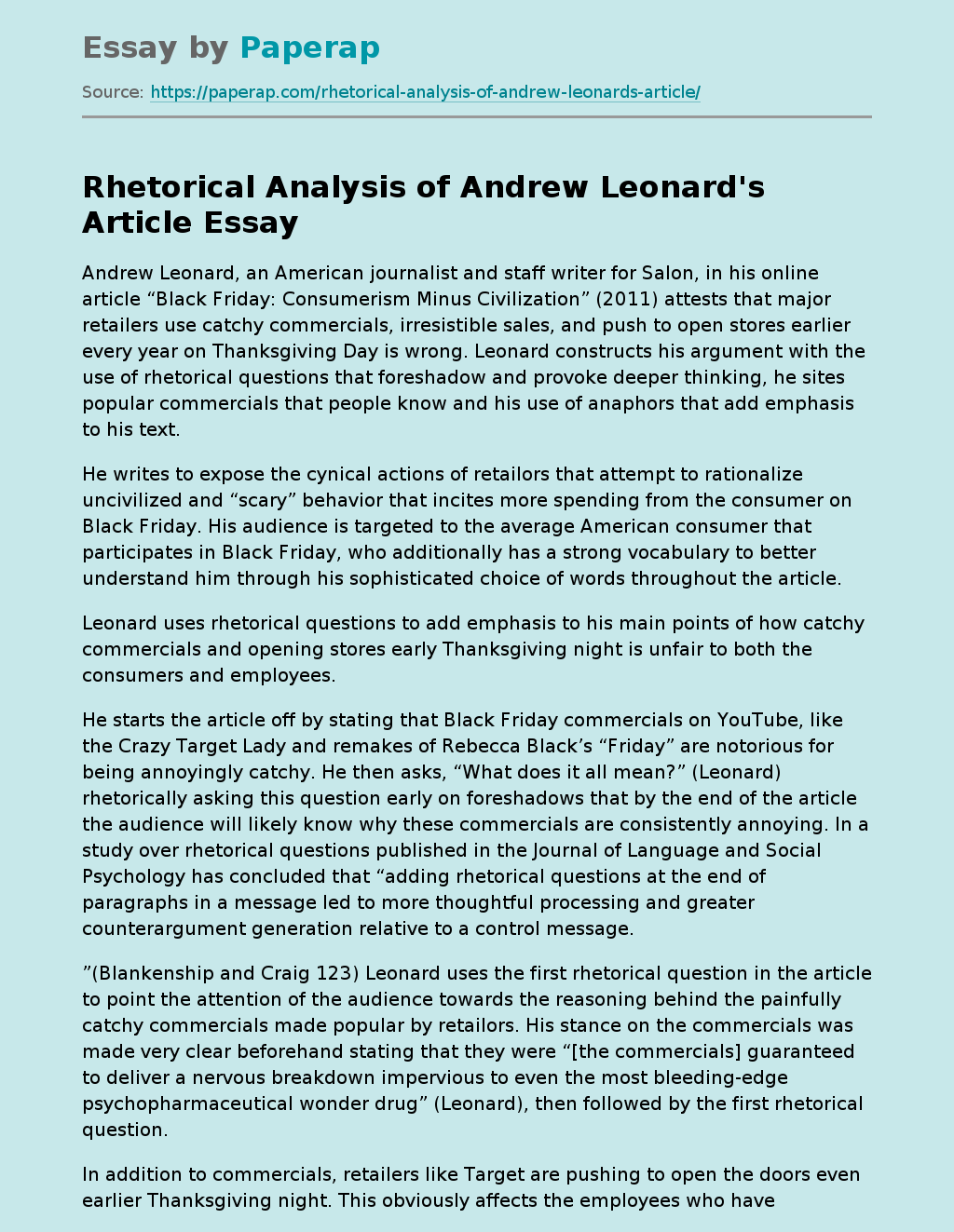Rhetorical Analysis of Andrew Leonard's Article
The following sample essay on:”Rhetorical Analysis of Andrew Leonard’s Article”.Andrew Leonard, an American journalist and staff writer for Salon, in his online article “Black Friday: Consumerism Minus Civilization” (2011) attests that major retailers use catchy commercials, irresistible sales, and push to open stores earlier every year on Thanksgiving Day is wrong.
Leonard constructs his argument with the use of rhetorical questions that foreshadow and provoke deeper thinking, he sites popular commercials that people know and his use of anaphors that add emphasis to his text.
He writes to expose the cynical actions of retailors that attempt to rationalize uncivilized and “scary” behavior that incites more spending from the consumer on Black Friday. His audience is targeted to the average American consumer that participates in Black Friday, who additionally has a strong vocabulary to better understand him through his sophisticated choice of words throughout the article.
Leonard uses rhetorical questions to add emphasis to his main points of how catchy commercials and opening stores early Thanksgiving night is unfair to both the consumers and employees.
He starts the article off by stating that Black Friday commercials on YouTube, like the Crazy Target Lady and remakes of Rebecca Black’s “Friday” are notorious for being annoyingly catchy. He then asks, “What does it all mean?” (Leonard) rhetorically asking this question early on foreshadows that by the end of the article the audience will likely know why these commercials are consistently annoying. In a study over rhetorical questions published in the Journal of Language and Social Psychology has concluded that “adding rhetorical questions at the end of paragraphs in a message led to more thoughtful processing and greater counterargument generation relative to a control message.
”(Blankenship and Craig 123) Leonard uses the first rhetorical question in the article to point the attention of the audience towards the reasoning behind the painfully catchy commercials made popular by retailors. His stance on the commercials was made very clear beforehand stating that they were “[the commercials] guaranteed to deliver a nervous breakdown impervious to even the most bleeding-edge psychopharmaceutical wonder drug” (Leonard), then followed by the first rhetorical question.
In addition to commercials, retailers like Target are pushing to open the doors even earlier Thanksgiving night. This obviously affects the employees who have to leave their families to go to work. Leonard goes on to explain how even with a quarter-million signatures against it they still open the doors. Concluding his statements he asks, “What does a Target employee forced to work at 11 p.m. on Thanksgiving have to give thanks for?” (Leonard). Unlike the first rhetorical question used this one provokes emotion in the reader emphasizing that no one should be working on Thanksgiving night. Leonard strategically uses rhetorical questions to express how retailors use commercials to get the consumer to spend more money and how the employees get the short end of the stick. The use of the first rhetorical question foreshadows that there is a deeper more iniquitous purpose for the commercials other than just being catchy, while the second tugs at the reader’s emotions to view opening Thanksgiving night as immoral and unfair to the employees.
In addition, Leonard uses an anaphora to compliment his first rhetorical question and add emphasis to how uncivilized and deceiving Black Friday has become. After the first rhetorical question, he states his opinions on Black Friday, “There is a point in our culture beyond which camp and kitsch no longer make the least ironic sense, where consumerism loses its last mooring to civilization, where even seemingly legitimate protest devolves into farce. That point is Black Friday.” (Leonard) The use of an anaphora at this point in the article shines a light on the relationship with the first rhetorical question pointing the reader in the direction that is what Black Friday really is today. (Pierre Cotte 23) “Anaphora preserves meaning, the uniqueness of the definite is, as it were, superimposed on the image of the reference, whatever it may be, that has been constructed by the context.” The definite Leonard refers to in his anaphora is Black Friday and describes it’s ‘uniqueness’ as borderline uncivilized in its own ways that being: tacky, showy in a tasteless annoying way, even ads found on the same pages as protests and petitions against opening early. Structurally speaking the use of a rhetorical question followed by an anaphora highlights how cynically calculated ads and commercials from retailers really are.
Rhetorical Analysis of Andrew Leonard's Article. (2020, Oct 29). Retrieved from https://paperap.com/rhetorical-analysis-of-andrew-leonards-article/

